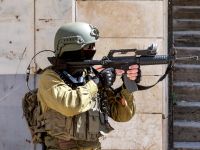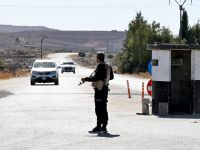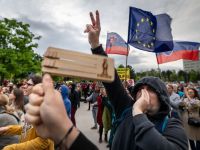Israeli troops in the Gaza Strip Saturday shot and wounded six Palestinians, underscoring skepticism about the latest Israeli promises to exercise restraint with the Palestinians.
The Gaza Strip began the day in celebration of Eid al-Adha, the Muslim calendar's most important holiday. But Palestinian medical sources said an 11-year-old boy was hit in the back by a bullet fired from a machine gun mounted on an Israeli tank as it moved toward a refugee camp in Rafah, near the southern border with Egypt.
Later, young Palestinians hurled stones at the troops, who fired back injuring five of them. A 13-year-old boy and a 25-year-old man were being treated for serious injuries in Rafah hospital, the sources told AFP.
The Israeli army on Friday pulled back from areas it had occupied in the central Gaza Strip in line with agreements reached at a joint meeting Thursday night of Israeli and Palestinian security officials.
Later Friday, the army dismantled road blocks that had split the Gaza Strip into three parts in line with the second step of a plan to reach a ceasefire amidst mounting bloodshed, an army spokeswoman told AFP.
In the West Bank, a Jewish settler shot a Palestinian man in the stomach Saturday as he and his family were hiking near the settlement of Pnei Chever, Palestinian medical and security sources told AFP.
The man was in serious condition.
Arafat
Palestinian Authority Chairman Yasser Arafat on Saturday rejected Israel’s Prime Minister Ariel Sharon's plan to create buffer zones between Israel and Palestinian territories.
"This so-called separation plan is a violation of the agreements," Arafat told Reuters in an interview in his office in the West Bank city of Ramallah.
"It creates cantons in our Palestinian areas, and the Oslo (1993 interim peace) agreement prevents cantons Sharon is trying to create. He has no right to do this. It's in violation of international law."
Arafat said Sharon's address "was not a speech of peace." The Palestinian leader said Israel's killing of some 40 Palestinians in the West Bank and Gaza Strip in the past week "was terrorism practiced by the occupation against our people, and a military escalation."
Arafat again called for the implementation of a U.S.-backed truce-to-talks plan and for the deployment of international observers "to end this aggression and this siege imposed on our people and areas." He added the Palestinians had been ready to make contact with Israelis at all levels, and noted senior Palestinian officials had met Sharon on February 1.
"Unfortunately, all these meetings ended without results," Arafat said. "I repeated my call for a ceasefire on Thursday and Israel's response was more military escalation."
Annan
Meanwhile, warning that the Israeli-Palestinian conflict risks sliding towards full-fledged war, the United Nations Secretary-General, Kofi Annan, Saturday urged the UN Security Council to work with both sides in resolving their conflict.
“The lack of mutual confidence between the two sides makes a third-party role essential,” Annan told the 15-member security body. “I truly believe that it is imperative for the Security Council and the wider international community to work in a concerted manner with the parties towards a just, lasting and comprehensive peaceful settlement of the conflict in the Middle East.”
In his brief speech, the Secretary-General recounted the “grim” news from the Middle East, cautioning that “we are nearing the edge of the abyss.” With more than 60 people killed over the past week, violence threatened to escalate even further, he said.
“Particularly alarming is the growing belief, among both Palestinians and Israelis, that there can be no negotiated solution to the conflict.”
The key interlinked problems, according to the Secretary-General, remained “occupation; security – the need to end violence including terrorism; and the economic deprivation and suffering.”
“Yet, even at this darkest of hours, there is still room for hope,” he added, recalling that both sides had agreed in principle on the Tenet understandings and the Mitchell Committee recommendations, which together defined an array of security, economic, and political measures that would have moved the parties back to the negotiating table.
While stressing the need to immediately reduce the violence, the Secretary-General said he had “become more and more convinced that trying to resolve the security problem on its own cannot work.”
Instead, he argued, security must be addressed alongside key political issues, particularly the question of land, and economic and social issues, including “the increasingly critical, desperate conditions of the Palestinians.”
“The outlook is bleak, but the present course of events is not irreversible,” said Mr. Annan. “Let us do everything in our power to persuade the parties to pull back from the brink, and return to the high road." (Albawaba.com)
© 2002 Al Bawaba (www.albawaba.com)







